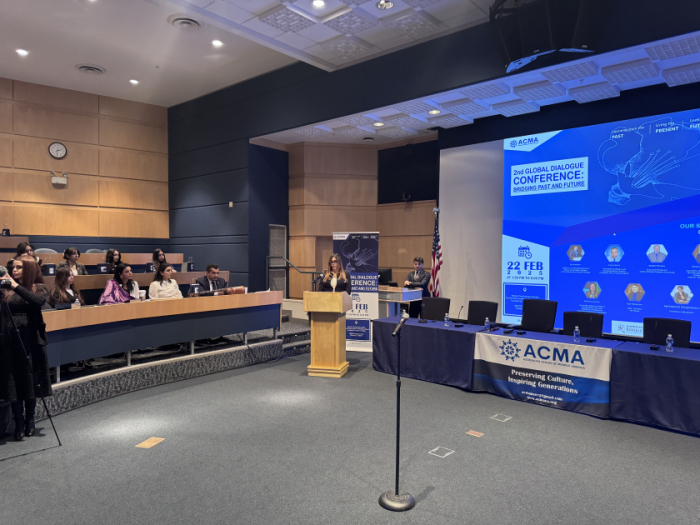The second Global Dialogue Conference, titled “Bridging Past and Future,” dedicated to the 33rd anniversary of the Khojaly genocide, was held in Chicago, Illinois.
The conference brought together international experts, representatives from the Azerbaijani community in the U.S., officials from the State Committee on Work with Diaspora, and employees of the Azerbaijani Embassy in the U.S.
Farid Mammadov and Mehriban Mammadova, co-chairs of the Azerbaijan Center of Midwest America (ACMA), emphasized the significance of such conferences in raising global awareness of the Khojaly genocide.
The national anthems of Azerbaijan and the U.S. were played, followed by a moment of silence to honor the victims. A documentary on the genocide was also screened.
In her opening speech, Selhat Abbasova, Director at the State Committee on Work with Diaspora, spoke of the lasting pain felt by Azerbaijanis worldwide due to the Khojaly tragedy. She underlined Azerbaijan's ongoing efforts to share the truth about the conflict, Karabakh, and the crimes committed against the Azerbaijani people. Abbasova also highlighted that Azerbaijan's 2020 liberation of occupied territories and the 2023 liberation of Khojaly have paved the way for reconstruction and the return of displaced persons.
She further emphasized that the souls of the Khojaly victims would find peace only when those responsible for the crime are held accountable and face justice.
A video highlighting President Ilham Aliyev’s recent visit to the liberated territories and his meeting with local residents was also presented.
A representative from Azerbaijan’s embassy in the U.S. highlighted the growing international recognition of the Khojaly genocide, citing resolutions from 11 U.S. states and statements and proclamations from over 15 states in remembrance of the victims.
During the panel discussions, Pakistani geopolitical analyst and journalist Malik Ayub Sumbal described the events in Khojaly as unimaginably horrific, calling for more countries to recognize this tragedy as genocide. He reminded the audience that 16 countries have politically acknowledged the atrocity, and the OIC has adopted 13 resolutions on the Khojaly genocide.
Professor Stefan Brooks of the US National Defense University stated that deliberately targeting unarmed civilians is a violation of the laws of war and the Geneva Conventions, adding that the events in Khojaly were a war crime.
Fabiana Ceyhan, President of the Brazilian Association of Journalists of International Area, shared her impressions as one of the first journalists to visit Karabakh after the 44-day war. She emphasized the importance of remembering such tragedies to prevent their recurrence and ensure they are not forgotten by the international community. Ceyhan added that since Khojaly was a civilian settlement, attacking the peaceful population was both an injustice and a crime.
Kelvin Dark, President of RC Communications and an expert on international relations and communications, shared his firsthand experience in Karabakh, highlighting the severe dangers posed by landmines. He explained that landmines reflect the scale of violence during the conflict, and their full clearance will require decades and billions of dollars. Dark also spoke about the attacks on Ganja during the war, stressing that the victims of the Ganja terror were families far from the front lines. He noted that it would take many years to heal the psychological impact of such attacks.
Ali Asgarov, a professor at the University of North Carolina, presented the factors behind Armenian territorial claims against Azerbaijanis before the Khojaly tragedy and provided evidence that the actions in Khojaly were genocide.
The event concluded with a speech by Tarlan Ahmadov, head of the Azerbaijan Society of Maine.
More about:
















































